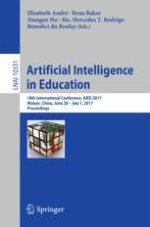
2017 | OriginalPaper | Buchkapitel
An Adaptive Coach for Invention Activities
verfasst von : Vincent Aleven, Helena Connolly, Octav Popescu, Jenna Marks, Marianna Lamnina, Catherine Chase
Erschienen in: Artificial Intelligence in Education
Aktivieren Sie unsere intelligente Suche, um passende Fachinhalte oder Patente zu finden.
Wählen Sie Textabschnitte aus um mit Künstlicher Intelligenz passenden Patente zu finden. powered by
Markieren Sie Textabschnitte, um KI-gestützt weitere passende Inhalte zu finden. powered by